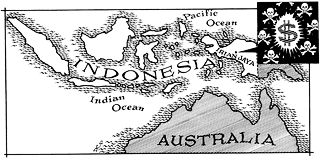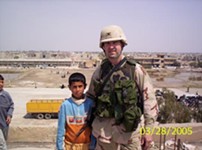Business as Usual?
Irian Jaya Killings Detailed in New Report
By Robert Bryce, Fri., May 1, 1998

Over the past 18 months, more than two dozen people have been killed or disappeared and more than 100 homes and churches have been burned to the ground by the Indonesian military in central Irian Jaya. Those are the findings of a new report documented by a group of human rights activists and church officials in Indonesia and the United States. The killings and destruction occurred in an area about 100 kilometers east of the gigantic Grasberg complex, a copper and gold mine operated by New Orleans-based Freeport-McMoRan Copper & Gold. The report is scheduled for release on May 4 in New Orleans, just one day before Freeport holds its annual shareholders meeting; it is the latest document to detail human rights abuses in Irian Jaya, the easternmost province in the Indonesian archipelago. Three reports released in 1995 detailed more than four dozen cases of torture, murder, and human rights abuses that occurred in and around Freeport's contract of work area. A preliminary draft of the latest report obtained by the Chronicle does not mention Freeport in connection with the latest series of abuses. Meanwhile, Freeport spokesman Bill Collier refuses to comment on the latest report.
"More than 160 structures have been destroyed," in areas near Mapnduma, a small village 90 kilometers east of the Freeport mine, explains Abigail Abrash, program director for Asia and the Middle East with the Washington, D.C.-based Robert F. Kennedy Memorial Center for Human Rights. "This is very similar to what the military did in East Timor," Abrash says. "People are dying of starvation after they've been pushed off their land. The military can kill in a number of ways. It doesn't always have to be a bullet through the head." Abrash says the killings and the destruction of the buildings, including 13 churches, appear to be reprisals by the Indonesian military against Irianese who are suspected to be sympathetic with the Free Papua Movement, which is known by the initials OPM for its Indonesian name. In 1996, the OPM took several Europeans hostage and held them captive for several months in the dense jungle before their release.
Already, the Indonesians who compiled the report are "extremely nervous," Abrash says. After all, she explains, the human rights reports released two years ago did nothing to protect the Amungme, Ekari, and other tribal people who live near the Freeport mine. Instead, the military increased the size of its operations, moving hundreds of additional troops into the area. Sources in Irian Jaya now put the number of troops in the region at between 1,500 and 2,000. Independent observers have reported that six armored vehicles are now stationed in the center of Timika, the mining town that serves as Freeport's base of operations.
According to Abrash, military operations in the region are headed by General Probowo, a son-in-law of Indonesian dictator Suharto. Probowo, says Abrash, also headed the military's operations in East Timor, the former Portuguese colony that has seen widespread human rights abuses. Independent human rights groups have estimated that the Indonesian military has killed some 200,000 East Timorese since the Indonesian military invaded the island in 1975.
The draft report indicates that some of the Indonesian soldiers believed to be responsible for the murders have been supported by helicopters operating out of a military base in Timika. One passage details the slaughter of 20 Irianese (including several children) by Indonesian soldiers. The soldiers herded the group into "pits in the earth used for cooking in the centre of the village. The 20 innocent civilians were then forced to enlarge the cooking holes in the earth and were executed without mercy by gunfire. The bodies of the victims were then put into the holes they had dug. Witnesses said that when they looked at the `mass slaughter hole' and uncovered them, they found decaying corpses of the victims. The bodies were buried crossing each other within the holes, perhaps to make sure that all 20 bodies would fit into the holes. According to witnesses, the slaughter in the village of Alama took place in the month of January l997."
Although the latest human rights report focuses on the Indonesian military and abuses that occurred in areas far removed from the company's mining area, Freeport remains a focal point for human rights and environmental activists. They point out that Freeport maintains a close relationship with the Indonesian military. Last December, the Far Eastern Economic Review reported that Freeport has spent $35 million building a new military base for the Indonesian military in Timika.
To call attention to Freeport's operations, representatives from Project Underground, Friends of the Earth, and Global Exchange are planning to participate in a May 4 conference in New Orleans on ethical investing, sponsored by the Seattle Mennonite Church. Last year, members of the church put forth a shareholder resolution urging the company to sever its ties to the Indonesian military and delay the expansion of the Grasberg mine until the social and environmental problems at the mine have been rectified. The shareholder resolution failed, however, garnering the support of only about 2.5% of the company's shareholders.
And while Freeport has blamed the Indonesian military for the human rights problems, Abrash says independent human rights analysts have never been allowed into the region to investigate the abuses that have occurred in Irian Jaya. "We think it's appropriate to do an independent human rights evaluation and assessment," says Abrash. "It's never been done and that means there are always questions about the human rights situation and what the company's involvement [Freeport's involvement] may or may not have been."
Independent observers in Irian Jaya contacted by the Chronicle indicate that the human rights situation in and around the Freeport mine has indeed deteriorated in recent months. One source, who asked not be identified, says, "I would say that the situation has not much improved over the last year. I even have the impression that it is worse, reminding myself [of] the cases we are still working on in connection with the Mapnduma area as well as... the clear lack of legal follow-up of some killings [one in front of local officials and security people] in the Timika area last year. For sure the security is more visible than ever since the beginning of 1996."
In addition to the latest human rights problems, Freeport appears to be having further difficulty in its negotiations with local villagers. In 1996, the company launched what has come to be known as the "one percent solution." The company proposed to dedicate one percent of its annual revenues to fund local development projects. But the proposal was quickly rejected by leaders of the Amungme tribe. And reports out of Irian Jaya indicate that a report funded by Freeport and released in the past few weeks admits that the one percent fund has been a failure.
Lawsuit Pending
Further complicating Freeport's position is the ongoing human rights lawsuit pending in New Orleans. Although a federal court action against the company was thrown out, a lawsuit filed in state court by Yosefa Alomang, an Amungme tribal member who was tortured by Indonesian military officials for a one-month period in 1994, is continuing. Alomang's lawsuit, which could force Freeport executives to testify under oath about their knowledge of the human rights problems, was further bolstered on April 15, when Louisiana's Fourth Circuit Court of Appeals reaffirmed its position that Alomang could bring her lawsuit against the company in New Orleans. The Alomang lawsuit is one of several human rights lawsuits that have been filed in American courts by foreign nationals seeking compensation from American companies operating overseas.
While the Alomang suit will take years to resolve, Abrash and other human rights activists are hoping to get more information about the latest killings by the Indonesian military. And they hope their report will finally allow them to do a complete investigation into the problems in Irian Jaya. "The incidents in the report are, quite possibly," says Abrash, "only the tip of the iceberg."
Got something to say on the subject? Send a letter to the editor.








